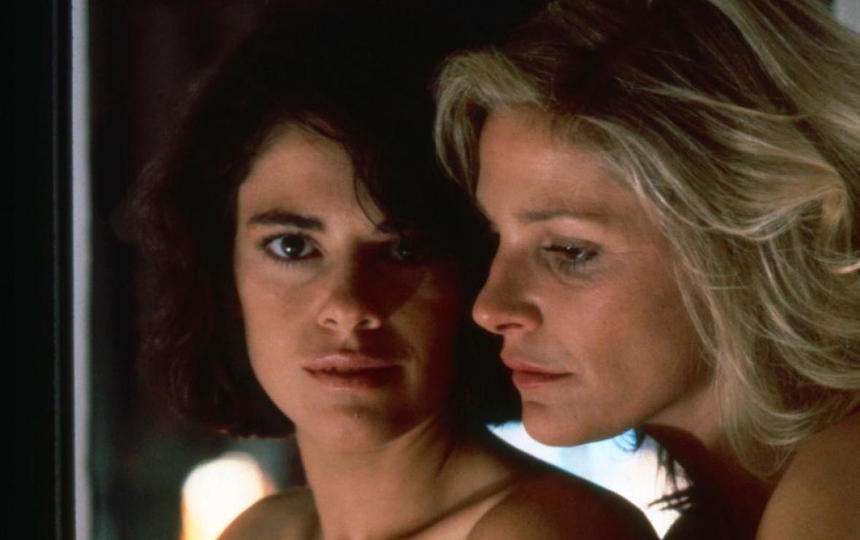Blu-ray Review: Landmark Lesbian Drama DESERT HEARTS Looks Tremendous and Feels Almost as Good
Donna Deitch's 1985 film sees two women falling in love against a breathtaking Nevada landscape.

A woman arrives in Reno by train and will leave the same way, with one seismic difference: she has met and fallen in love with Cay (Patricia Charbonneau), a local artist and resident free-spirit. The year is 1959, and Vivian (Helen Shaver) is in Reno to get divorced. (In 1959, did people always have to go to Reno to get divorced?) She's an academic leaving a loveless, functional marriage. The idea of falling for a woman has never entered her wildest speculations.
Modern audiences will inevitably connect Donna Deitch's 1985 independent film, Desert Hearts, with Todd Haynes' masterpiece of twenty years later, Carol. Both are set in the 1950s and feature older/younger relationships forming between an experienced woman and a woman only beginning to discover she is a lesbian. Both films are based on significant novels about the lesbian experience in America, and both -- unusually for their genre -- at least suggest a happy ending, as opposed to "a bisexual triangle or a suicide," as Deitch herself puts it. In watching Desert Hearts, though, I also realize that neither film outright assures us that the happy ending takes place. They both end suggestively.
You could call this a spoiler, I suppose, though I don't think Desert Hearts is as much about its (again, ambiguous) ending as it is about the process of watching Cay and Vivian fall for each other, seduce one another, confuse one another, and so forth; and what all of those things reveal about character. Deitch's film is a pinpoint character study of Vivian. As played by Shaver, now a noteworthy television director in her own right (Orphan Black; Vikings), Vivian is by turns cold, fretful, honest, and wracked with the kind of all-over anxiety of someone transitioning into a completely unfamiliar set of ideas and expectations.
Charbonneau's Cay, meanwhile, is granted one of the great screen intros of all time, when she sees Vivian drive by (in the opposite direction) on the highway, and immediately slams her convertible into reverse and begins pacing Vivian's car backwards, just to get a longer look at her. Also in the car is Cay's sorta-stepmother Frances, played by Audra Lindley, who audiences will remember (or completely fail to know what I am even talking about, depending on your age) as Mrs. Roper. This sets up one of the film's crucial tensions, as Frances observes, and then begins to actively resent, Vivian and Cay's burgeoning relationship.
Written, produced, starring, and directed by women, Desert Hearts would be a rarity even today, and for 1985 counts as a feminist high water mark. Set as it is in the Nevada desert, the film has a vaguely Western sensibility to its visuals. Here, director of photography Robert Elswit (a frequent Paul Thomas Anderson collaborator, who shot There Will Be Blood among others) helps lens a film that vastly outpaces its slender $800,000 budget. Restored at 4K for the Criterion release, Desert Hearts looks amazing, with wide open skies that warm the screen, and sensuous portraiture as the character drama intensifies.
The disc is nicely supplemented with recollections by the key members of the cast and crew. An audio commentary by Deitch (a welcome rarity these days!) was recorded in 2007 and resurrected here, embellished by newly-shot interviews with Deitch, Charbonneau, Shaver and Elswit. Deitch also goes one-on-one with actress Jane Lynch, who fangirls all over the director and Desert Hearts in a conversation that is almost too quick and fragmented to make sense of it. (It's fun, though, watching Lynch extol the enormous impact Desert Hearts had on her as a young woman.)
The last supplement might in fact be the disc's neatest pull: a six-minute excerpt from Fiction And Other Truths: A Film About Jane Rule, a documentary about the author upon whose Desert of the Heart the film is based. It outlines sharply the extraordinary homophobia and social unease that greeted the release of the book in 1962, and contains a nice anecdote from fellow Canadian author Margaret Atwood, about the proper response to a wrathful moralist approaching the author in a grocery store.







